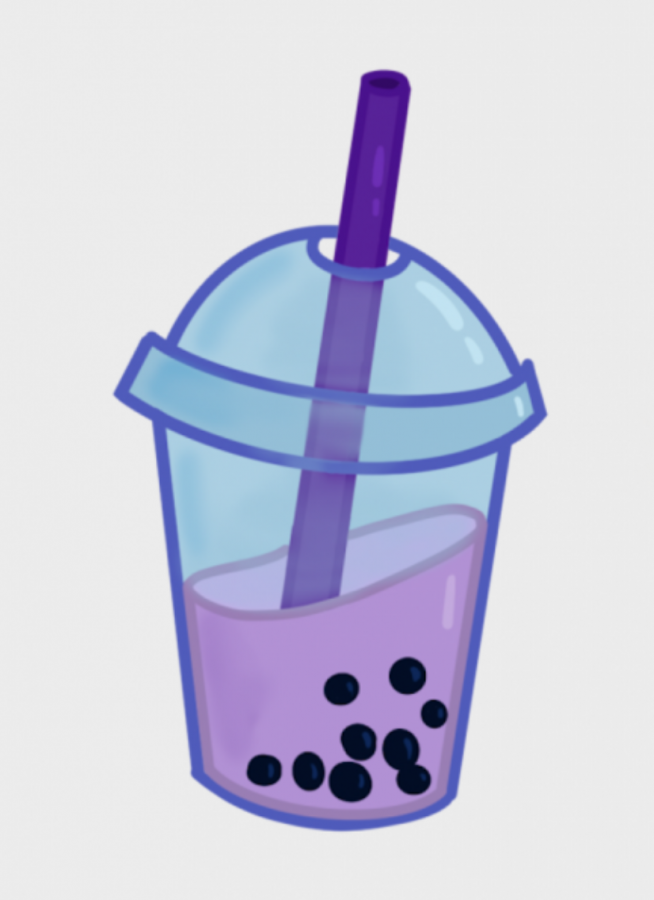Your donation will support the student journalists of The Tide, Richard Montgomery High School's student newspaper. Your contribution will allow us to purchase equipment and cover our annual website hosting costs.
Bubble tea shops under Montgomery County’s ban on plastic straws
April 8, 2021
Graphic by Valerie Wang and Kisha Yan
Last December, the Montgomery County Council passed a bill banning single-use plastic straws, which will take effect on May 1, 2021.
Bubble tea straws are a controversial but crucial part of the whole boba experience. Piercing the lid, sliding the straw in, and sipping the flavorful tea and tapioca pearls all add to the adventure. Many bubble tea enthusiasts would agree that enjoying a boba drink would not be the same without the iconic wide straw. However, most boba straws are disposable and made with plastic, which is harmful to both wildlife and the environment.
Many restaurants besides bubble tea shops also use disposable straws that could pollute the ocean or environment. In an effort to reduce plastic waste, the Montgomery County Council passed a bill banning single-use plastic straws. This legislation is expected to take effect on May 1, 2021, while also providing a period of 12 months for businesses and restaurants to phase out plastic straws.
The only exemption in this legislation is for those with disabilities. People with special needs may rely on straws to consume food and beverages, and plastic straws appear to be the safest and most convenient option for them. So, restaurants and food-service facilities will still keep a small supply of straws to provide for the disabled. But, it is required that those straws be made out of biodegradable material.
With a ban on plastic straws, restaurants and businesses will need to find alternatives that are either reusable, recyclable or compostable. These include durable reusable plastic, metal, bamboo, silicone, plant-based compostable products and compostable paper straws. Some restaurants may even be able to get rid of their plastic straws entirely.
As for bubble tea straws, finding alternatives is not that easy. First of all, size is an issue, since a normal sized straw would not be able to take in a whole tapioca pearl. Also, some solutions are simply too costly to be a realistic option for many businesses. Reusable options with materials such as silicone, metal and bamboo are too expensive to be produced in high quantities like regular plastic straws. Another potential problem is that the material may not suit boba drinks. For instance, paper straws become saturated with moisture very quickly, and glass straws are not sharp enough to break through the lid of bubble tea drinks.
Eliminating their straws completely does not seem like an option for boba businesses either. Without straws, customers would not be able to drink the bubbles. Without bubbles, bubble tea is just “tea”. This raises an issue among consumers—will they be willing to accept alternatives, or will they lose interest in this popular dessert drink?
Unfortunately, bubble tea businesses cannot simply ignore the straw ban just to please customers. According to the bill, violation of the ban would be a Class B violation, resulting in an initial fine of $100 and $150 for each repeated offense.
Luckily, there are still some solutions and substitutes for plastic boba straws. Loliware, a company dedicated to solving the global plastic crisis, developed their own edible, hyper-compostable straws. The straws are made with seaweed, but look and act like regular plastic ones. However, unlike plastic, these straws are eco-friendly. If a Loliware straw ends up in the ocean or on the ground, it will quickly biodegrade.
Loliware produces regular sized straws, as well as variations designed for bubble tea. As for the material, seaweed is renewable and therefore sustainable as a resource for straws. This provides a cheaper straw alternative compared to the metal and silicone based straws.
Another plus is that seaweed has the advantage of quickly capturing CO2. Seaweed uses photosynthesis to turn carbon dioxide into seaweed biomass, which is a process called carbon sequestration. So, these straws are also helping the earth clean up CO2 in the atmosphere.
Montgomery County’s straw ban will definitely change the way we enjoy bubble tea, but hopefully, companies like Loliware can come and save the day, as well as the environment and the bubble tea experience.
